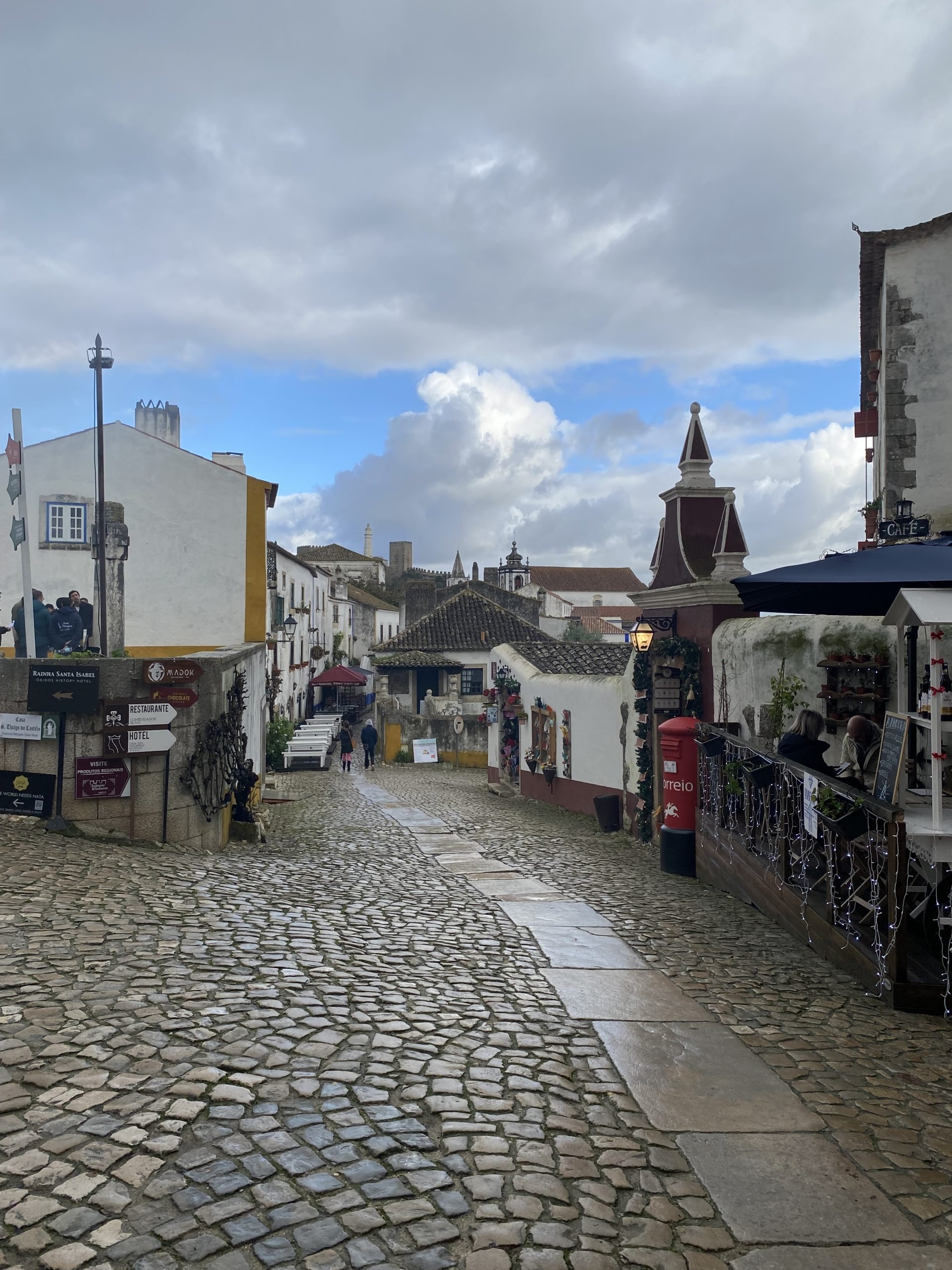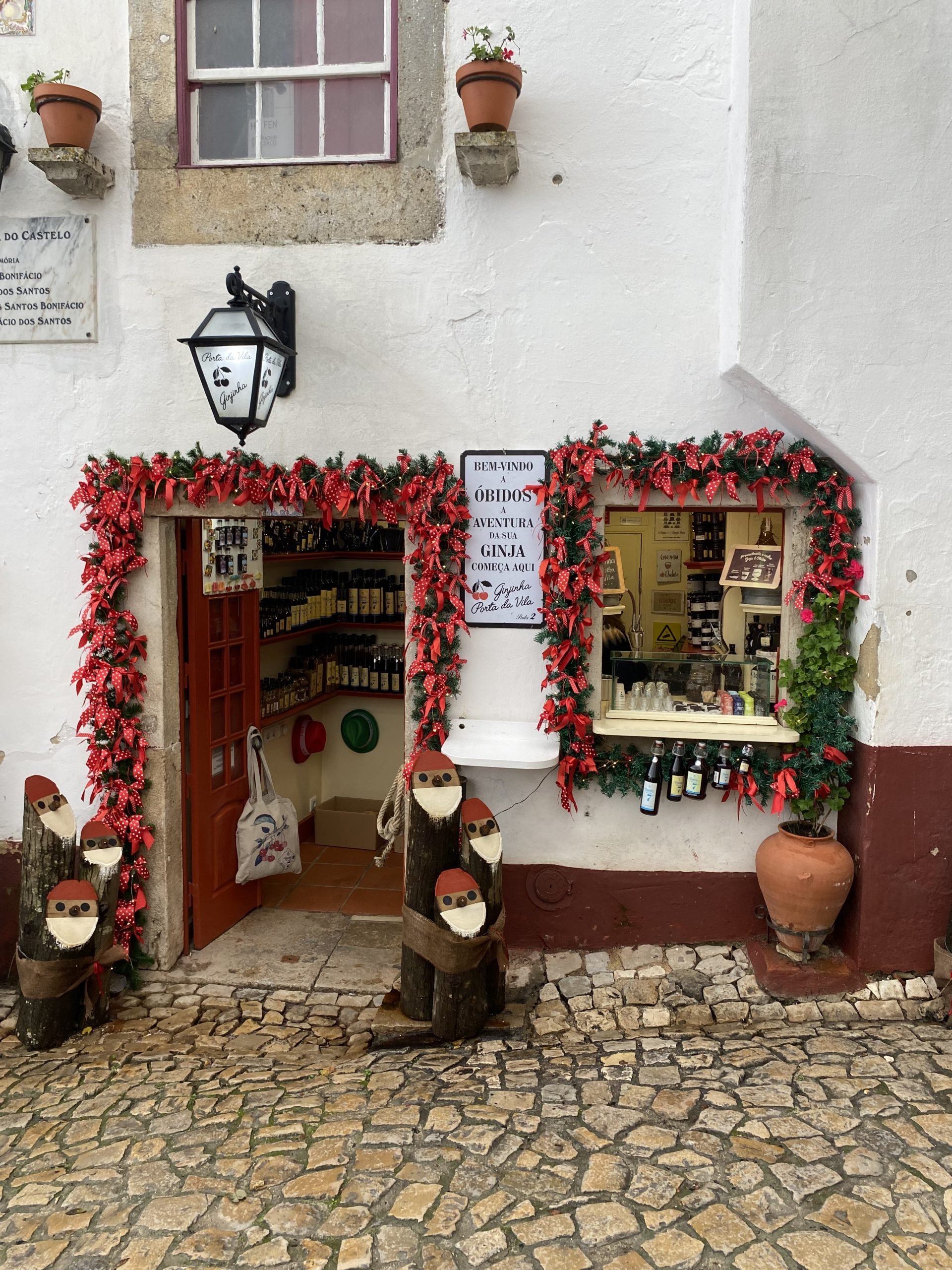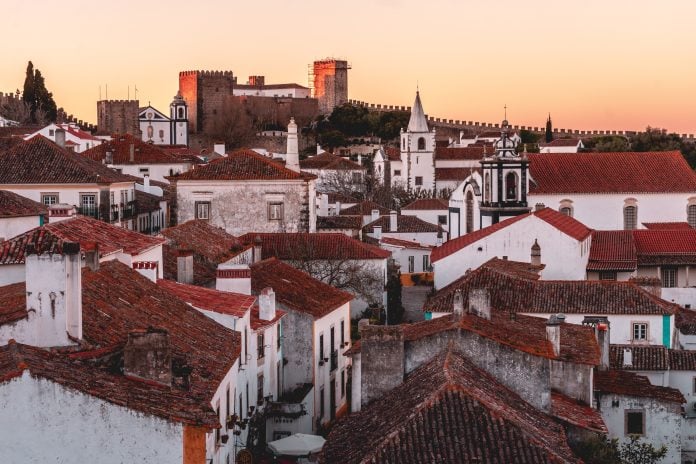From the Latin term “Oppidum”, the name of the main settlement in any Ancient Roman administrative area, we got the name of this Portuguese town. Óbidos is situated in the Center region of Portugal, in the district of Leiria. It’s around 88 km from Lisbon and 138km from Coimbra.
It has a small population of about 2.200 inhabitants, but nearly 11.800 if we count the whole municipality. The town is known for its wonderful castle and walled city that immerse you in a medieval environment, making you feel like you are back in the 1600s.
Its history is a very rich one as well. The place was inhabited by the Lusitanians until the Romans arrived. There, they built what would one day become the Castle, but just as an outpost for the Roman Legions.
The Visigoths took over after it but it was when the Muslims came, in the 8th Century, that the outpost was turned into a city. A wall was built all around the settlement and they fortified the Roman outpost, turning it into a Castle.
This ended in 1148, when Afonso Henriques, the first king of Portugal, conquered it and integrated the town into its Kingdom. From then on, the town was part of the dowry for various Portuguese Queens, such as Queen Catherine, who would then build the town’s Aqueduct.
Today, it’s one of the most distinctive towns in the Center of Portugal. Throughout the walled city, you can find narrow cobbled streets, with traditional houses all around, some being living houses and others being restaurants or businesses. Its amazing level of preservation is remarkable and makes it a wonderful example of a traditional Portuguese town.
Outside of the walls, you can see the Aqueduct, and if you want to explore the nearby area, you can find the fishing village of Peniche and Nazaré, where the highest waves in the world exist, the amazing beaches of Lagoa de Óbidos, and you can see the largest collection of Buddha statues in Europe, at Buddha Eden Garden, in Bombarral.
As for Óbidos proper, you can expect a small town, pretty calm throughout the year, except during the period when the Christmas Village is on and during the summer, where people from all over the country fill the walled town.
If you like to roam around old cities and see for yourself the history of a whole settlement, and with it the country, Óbidos will be a great trip for you!

Famous Landmarks in Óbidos
Óbidos Castle
Considered Number 2 on the 7 Architectural Wonders of Portugal, the Castle is placed on a cliff, and inside the city is at the end of Rua Direita.
As said before, the medieval castle was conquered by the Portuguese to the Moors, being a reconstructed Roman outpost. It suffered various repairing and fortification efforts, mixing Romanic, Gothic, Manueline, and Baroque architecture, as well as some Moorish characteristics.
Today, it’s completely restored and is one of the most beautiful castles open to the public, functioning today as a hotel. If you want to get the best view of the whole Castle, you can go to the Medieval Market, at the back of the Castle.
The City Walls
The Walls that surround the town are one of its main attractions! Its perimeter is 1.565 meters (around 5134 ft), totally surrounded by a walking path on one side and a battlement on the other. They were defended by some towers that you can see throughout the town.
You can walk through the walls, but be careful because they have no handrail and there have been episodes where people fell off. The access is from 3 stairs, 2 next to the village and a third one right near Porta da Vila (the Village Door).
“Porta da Vila” (Village Door)
The Village Door, or “Porta da Vila”, is the main entrance to the interior of the walled city.
It was built in 1380 and it’s all adorned with the beautiful Portuguese “azulejos”, with an engraving dedicated to the Virgin Mary, due to her protection during the Restoration of Independence, in 1640. Inside the Door, you can find a little chapel to Our Lady of Mercy, the town’s patroness.
It has a medieval military architecture, noted by its double door and the fact that is elbow-shaped, to provide a better defense of the town.
“Rua Direita” (Right Street)
This is the main road in the city, connecting the Village Door to the Castle, on opposite sides of it. Most of the buildings on it are souvenir stores, restaurants, and town attractions.
All of it is a cobbled street, you can see in it beautiful flowers on many windows, exposed handicrafts by local builders, and many small streets connecting to it that will just call for you to take a peek.
Aqueduct
Standing outside the Walled City, you can see the Óbidos’ Aqueduct from the highest tower in the wall. Built in 1573 by Queen Catherine, who paid for its entire construction, it’s around 3km long (around 1.86 miles) and it used to deliver water to 2 fountains in the town. Today, it’s a Public Interest Monument and a very beautiful sight to see from the walls.
Book Tours & Activities in Obidos
What to do in Óbidos
You can just roam around the city, see the incredible churches, libraries, and handicrafts all spent around the town. You will be able to see it all pretty quickly and you will not be disappointed!
But if you are looking for some activities to do, here they are:
Óbidos’ “Ginjinha”
One of the most famous Portuguese liquors, the Óbidos’ Ginjinha is world renown and makes everyone fall in love with it.
Usually served in a chocolate cup, this type of drink has been present in Portugal for centuries, with the oldest record of it being in the 1st century.
In the West of Portugal, where Óbidos is, the climate is particularly good for wild Morello cherries, making the appearance of this drink here, natural. But it was only in the 17th century that the priests of Óbidos started to use these fruits to make the drink we all know and love today.
It’s made out of Morello cherries, sugar, and Aguardente, a very strong liquor with 29% to 60% alcohol level, the “Ginjinha” has a strong flavor and scent, with a dark red color. It can be served with just the liquor or with fruits in it, sometimes even with vanilla or a cinnamon stick.
Today, it is presented in every café and restaurant in the town, with many stores even built specifically to sell it! Besides this, if you visit the house of a person from Óbidos, it is very likely that you will be presented with a small cup of this typical liquor.

Medieval Market
Standing on the backside of the Castle, the Medieval Market is accessible through the Stone Portal. It’s usually free, except during the Christmas Village, Medieval Fair, and the Chocolate Festival, so you can get a beautiful view of the Castle without paying anything!
Christmas Village
From 30 November until 2 January (more or less), you can visit the beautiful Christmas Village! The whole Medieval Market is decorated like Santa’s Workshop and you can ride an amazing Christmas Train or have a hot chocolate at the Ice Bar, a bar made entirely of ice.
It’s an amazing place to take the kids and even for adults, taking you back to your childhood and feeling that warm fuzzy feeling of Christmas! The entrance costs around 7€.
Medieval Fair
The Medieval Fair happens in July and August when this part of the town all dresses up as it once was in the 1600s. You will find traditional food and drinks, medieval music, Knight Fights and you can even participate in a Bow and Arrow Competition!
For the price of 7€ to enter, it will truly be a well-spent day that you will not regret!
Chocolate Festival
The iconic festival happens around April and May, costing just 5€ to enter.
There you can find all kinds of chocolate, both in taste and in shape. Amazing sculptures do artwork all made out of chocolate, while incredible cooks reinvent drinks and food to include the blessing from the skies that is chocolate.
Exhibitors from all over Portugal and the world come to present their products at this festival, so you are assured to have plenty of options and quality.
If you are a chocaholic, you will definitely lose your mind at this Festival.
Getting to Óbidos
You can get to Óbidos by car, bus (from “Rodoviária do Oeste”) or train.
If you go by car from Lisbon, you will take around one hour to get to the town and spend around 10€ for your trip (gas and tolls included). You can park the car just outside the city walls and then walk inside by foot.
The bus is probably the best option, as from Lisbon, you can get to Óbidos in around an hour. The ticket costs around 8€ and you can get it straight from the driver, stopping just 100m from the city center.
As for the train, is the longest and least preferable route, as it takes around 2:30h from Lisbon and the station is 1km outside the historical center of the town.
Booking.comFinal Remarks
Óbidos is truly a great day trip! It’s a must-see if you are planning to stay and discover more of the region near Lisbon and in the Center of the country!
I would recommend for you to visit it in either spring or fall. Around Christmas, it’s usually packed with people for the Christmas Village, and in summer it’s filled with tourists.
However, if you really want to see the Christmas Village or the summer is the only time you can go, try to visit it early in the day, before the big masses of tourists arrive, or spend the night in the town, so you can make the most of it and enjoy the relaxed and peaceful environment of the evening in Óbidos, spent in family-run restaurants eating home-cooked traditional recipes.
Also, take in mind that the city is really small and you can definitely see it all in less than a day, however, I would recommend you see it by yourself and not with a tour company, as you can do it at your pace and not have to rush to go to some other place next.
As a city that is made of history, with its literal walls telling the story of the peoples that passed through Portugal, from the Romans, passing through the Reconquista, and of the various periods and thoughts that passed through the country after that, you will definitely love every corner of Óbidos!
Hope you have a lot of fun in this little jewel in the Center of Portugal!
⬇️Please share your favorite activities and things to do in Obidos in the comments⬇️



I know Óbidos. The medieval village belong to historic portuguese province of Estremadura
One of Europe’s best preserved medieval villages in the north of Lisbon region. It is only an hour away from the Portuguese capital.